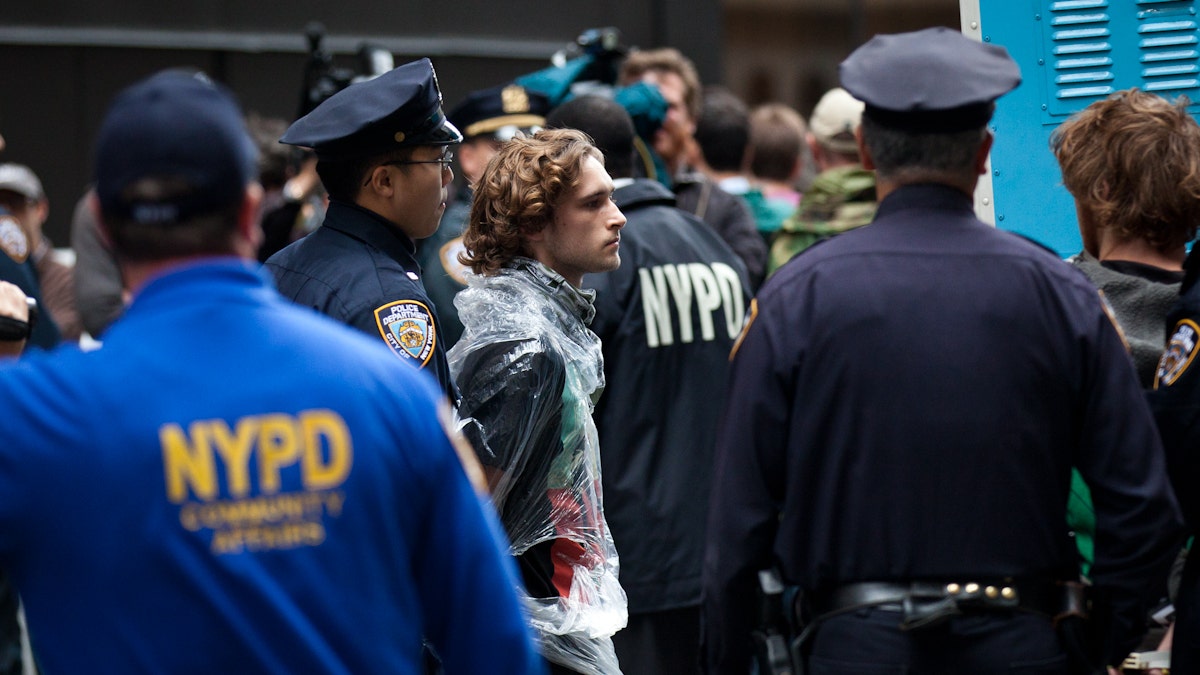
A demonstrator affiliated with Occupy Wall Street protests is arrested during a march near the financial district's Zucotti park, Monday, Oct. 12, 2011, in New York as the protest entered its fourth week.
Never before has a boisterous campaign of civil disobedience – marked by more than 700 arrests – received the kind of warm welcome from a sitting president and his party that President Obama and leading Democrats have accorded the “Occupy Wall Street” movement.
In the course of a single day last week, Obama, Vice President Biden, and House Minority Leader Nancy Pelosi all voiced, in varying degrees, their support for the anti-corporate demonstrators whose rallies over the last month have spread to 13 cities and drawn more than $60,000 in online donations.
“The protesters are giving voice to a more broad-based frustration about how our financial system works,” Obama told reporters last Thursday,
On that same day, Biden, fielding questions before a symposium audience in Washington, likened the movement to the Tea Party, and asked: “Why is it increasing in terms of the people it's attracting? The core [reason] is the bargain has been breached with the American people.”
And that afternoon, at her weekly news conference, Pelosi, D-Calif., proved most effusive in her praise of the demonstrators, saying: “God bless them for their spontaneity!” She went on to predict that their protests will prove “effective.”
At the same time, the Democratic Congressional Campaign Committee, or DCCC – the fundraising arm of House Democrats -- has forged the party’s clearest operational link with the movement.
An online petition at the DCCC website urges 100,000 party members to “stand with” the movement. As of late Wednesday, some 40,000 visitors had clicked a button to say they “like” the page.
Leading Republicans, for their part, have criticized the protesters in unsparing terms.
“I, for one, am increasingly concerned about the growing mobs occupying Wall Street,” said House Majority Leader Eric Cantor, R-Va., last Friday.
Rep. Peter King, the New York Republican who sits on the House Financial Services Committee, speaking the day before, was even sterner.
“What they're doing is disgraceful,” King said of the protesters, in an interview with Fox News. “They should be denounced; they're breaking the law; they're serving no real purpose at all….And for the president or anyone else to give them any credence or credibility is also irresponsible.”
With Fox News polls showing only one in three independent voters approving of Obama’s job performance – a percentage virtually unchanged from September 2010 – he and his supporters may have calculated that their surest route to retaining the White House in 2012 is to fire up the party’s liberal base.
But in interviews with Fox News, analysts from both sides of the political aisle invoked recent history to highlight what they see as the political perils inherent in the Democrats’ embrace of the Wall Street protests.
“I think Democrats are tempted to reproduce the same dynamic that occurred with the Tea Party on the right,” said Julian Epstein, a Democratic consultant with long experience on Capitol Hill. “They need to figure out what [Bill] Clinton figured out masterfully, which is: How do you motivate the kind of activist, leftist base without offending the independents and the centrists?”
Epstein called it a “mistake” for the Obama White House and Democratic congressional leaders to align themselves too closely with the Wall Street protests, however, because he predicted that members of the movement will inevitably say “stupid things” that leading Democrats will be forced to repudiate.
He also pointed out that the protesters are implacably opposed to three initiatives – the TARP and auto industry bailouts, and the continuation of the Bush-era tax cuts – that Obama has supported.
Pete Wehner, a former official in the Reagan administration and both Bush White Houses, predicted the Republicans will have a field day tying the president and Democratic congressional candidates to the Wall Street protests, which Wehner called a “fringe” movement that plays to the Democratic Party’s “worst stereotypes.”
“I suspect what you're going to see in the coming days and weeks is the Republican Party try to attach the Democratic Party at the hip to OWS,” Wehner said. “That's exactly what Nixon did with the counterculture….And that had a tremendous appeal to the center of the country, and it helped explain his election in 1968, and his re-election, by a huge margin, 49 states to one, in 1972.”











































